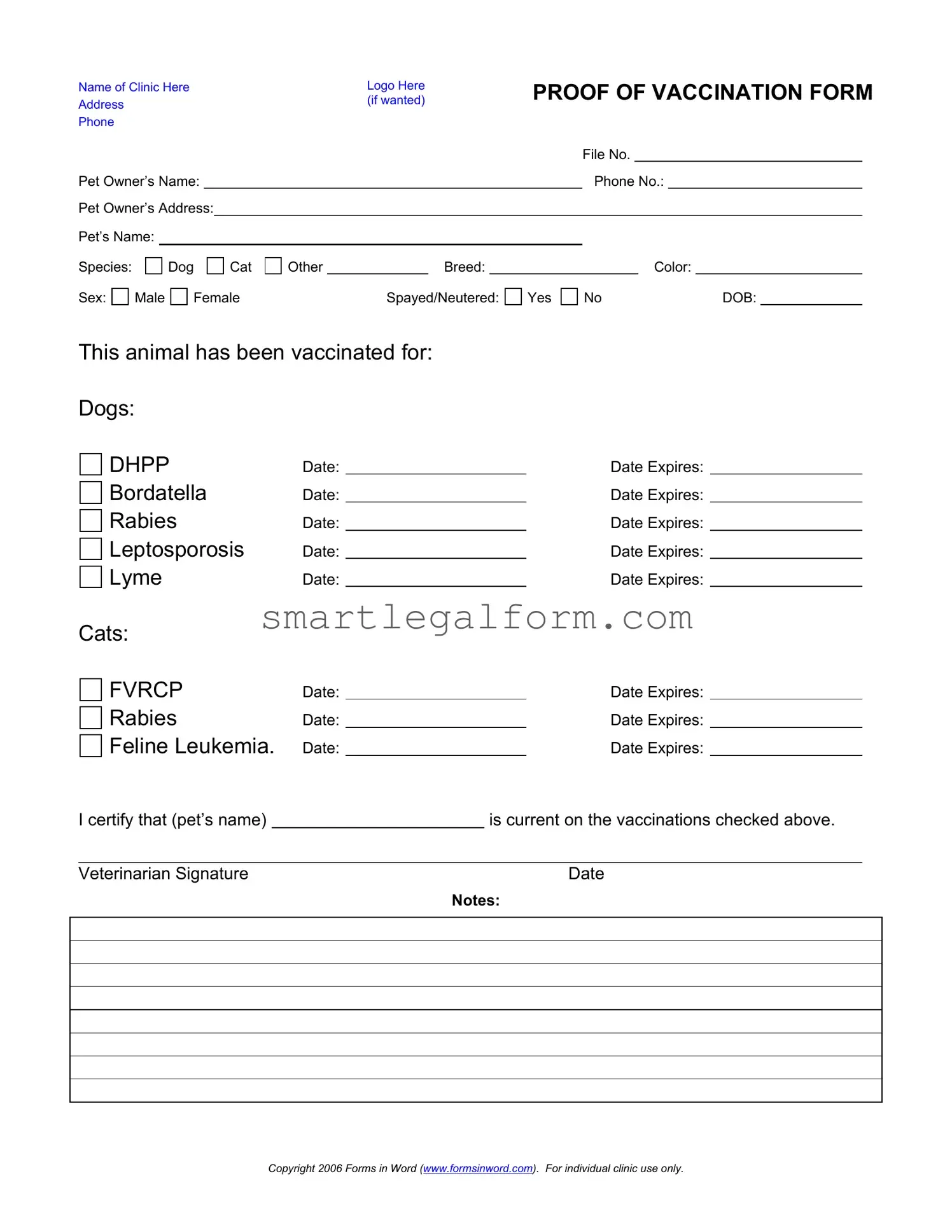Free Proof Of Vaccination Dog Form
Form Preview Example

Name of Clinic Here |
Logo Here |
Address |
(if wanted) |
|
|
Phone |
|
PROOF OF VACCINATION FORM
|
|
|
|
|
|
|
|
|
|
|
|
File No. |
|
|
|
||
Pet Owner’s Name: |
|
|
|
|
|
|
|
Phone No.: |
|
|
|
||||||
Pet Owner’s Address: |
|
|
|
|
|
|
|
|
|
|
|
|
|||||
Pet’s Name: |
|
|
|
|
|
|
|
|
|
|
|
|
|
|
|
||
Species: |
|
|
Dog |
Cat |
Other |
|
Breed: |
|
|
|
|
Color: |
|
|
|||
Sex: |
Male |
Female |
|
Spayed/Neutered: |
Yes |
No |
DOB: |
|
|||||||||
This animal has been vaccinated for:
Dogs:
DHPP
Bordatella
Rabies
Leptosporosis
Lyme
Date: |
|
Date Expires: |
Date: |
|
Date Expires: |
Date: |
|
Date Expires: |
Date: |
|
Date Expires: |
Date: |
|
Date Expires: |
Cats:
FVRCP
Rabies
Feline Leukemia.
Date: |
|
Date Expires: |
Date: |
|
Date Expires: |
Date: |
|
Date Expires: |
|
I certify that (pet’s name) |
|
is current on the vaccinations checked above. |
|
|
|
|
|
|
|
Veterinarian Signature |
|
Date |
|
|
|
NOTES: |
|
|
|
|
|
|
|
|
|
|
|
|
|
|
|
|
|
|
|
|
|
|
|
|
|
|
|
|
|
|
|
|
|
|
|
|
|
|
|
|
|
|
|
|
|
|
|
Copyright 2006 Forms in Word (www.formsinword.com). For individual clinic use only.
Common mistakes
Filling out the Proof of Vaccination Dog form can be straightforward, but many people make common mistakes that can lead to confusion or delays. One frequent error is leaving out the pet owner's name. This essential information helps ensure that the vaccination records are linked to the correct individual. Without it, clinics may struggle to contact the owner if needed.
Another mistake often seen is failing to provide a valid phone number. This detail is crucial for follow-up questions or to notify the pet owner about any upcoming vaccinations. A missing or incorrect phone number can hinder communication.
When it comes to the pet's information, many people forget to include the pet’s name. This omission can create confusion, especially if multiple pets are being vaccinated at the same time. Each pet’s records must be clearly identified to avoid mix-ups.
Additionally, it's common for pet owners to skip the species section. While it may seem obvious, specifying whether the pet is a dog, cat, or other species is vital for accurate record-keeping. This detail ensures that the right vaccinations are administered.
Another area where mistakes frequently occur is in the breed section. Owners sometimes leave this blank or enter an incorrect breed. Providing accurate breed information helps veterinarians determine the appropriate vaccinations and care for the pet.
Some individuals neglect to indicate the color of their pet, which can also lead to confusion. Including the pet's color can assist in identification and help clinics keep better records.
Another common error is not selecting the sex of the pet. Whether the pet is male or female is important for medical records and treatment plans. Forgetting to check this box can lead to misunderstandings about the pet's health needs.
Pet owners sometimes fail to indicate whether their pet is spayed or neutered. This information is essential for vaccination protocols and can impact the pet's health recommendations. It’s important to clarify this status to ensure proper care.
Many people also overlook the date of birth (DOB) of their pet. Providing an accurate DOB helps veterinarians track vaccination schedules and assess age-related health risks. An incorrect or missing DOB can complicate the pet's medical history.
Finally, a frequent oversight is not obtaining the veterinarian's signature on the form. This signature is a confirmation that the vaccinations have been administered and are up to date. Without it, the form may be considered incomplete, leading to potential issues when presenting the proof of vaccination.
Dos and Don'ts
When filling out the Proof of Vaccination Dog form, it’s important to follow certain guidelines to ensure accuracy and compliance. Here’s a list of what you should and shouldn’t do:
- Do provide accurate information for all fields, including your pet’s name and breed.
- Do double-check the vaccination dates to ensure they are current.
- Do include your contact information for any follow-up questions.
- Do sign and date the form to certify its accuracy.
- Don't leave any required fields blank; incomplete forms may be rejected.
- Don't use abbreviations or shorthand that could lead to confusion.
- Don't forget to check the expiration dates of vaccinations.
- Don't submit the form without verifying that all information is legible.
Other PDF Documents
Dd 214 - Understanding its contents can empower veterans in their benefits process.
Cair Login - Using this form helps prevent missed vaccinations as children grow and develop.
When entering into agreements that involve risk, it's crucial to understand the implications of a Hold Harmless Agreement. This form allows one party to be protected from liability, fostering a safer transaction environment. To learn more about the specifics and requirements for such agreements, you can visit OnlineLawDocs.com, which provides valuable resources and templates for California. Understanding these details is essential for individuals and businesses alike to ensure they are adequately protected.
Bill Lading - The Supplement can enhance clarity regarding shipment specifics.
Similar forms
-
Health Certificate: Similar to the Proof of Vaccination Dog form, a health certificate provides verification that an animal is healthy and up to date on vaccinations. This document is often required for travel or boarding.
-
Pet Adoption Agreement: This document outlines the terms of adopting a pet, including vaccination status. It ensures that the new owner is aware of the pet’s health history, similar to how the vaccination form communicates vaccination details.
-
Microchip Registration Form: Like the Proof of Vaccination Dog form, this document serves to keep track of important information about a pet. It includes details about the pet's microchip and owner, ensuring that the pet can be identified if lost.
-
Veterinary Treatment Record: This record documents all veterinary visits and treatments. It is similar in that it provides a comprehensive view of a pet's health history, including vaccinations.
-
Dog License Application: This application often requires proof of vaccinations. Just as the Proof of Vaccination Dog form confirms vaccination status, the license application ensures compliance with local regulations.
-
Travel Health Certificate: Required for traveling with pets, this document certifies that a pet has received the necessary vaccinations. It parallels the Proof of Vaccination Dog form in confirming the pet’s health status.
-
Pet Insurance Policy: When obtaining pet insurance, proof of vaccinations is often necessary. This policy outlines coverage and includes health details, similar to the vaccination form.
-
Pet Boarding Agreement: This agreement typically requires proof of vaccinations before a pet can be boarded. It ensures that all pets are healthy, much like the Proof of Vaccination Dog form.
- Durable Power of Attorney: A Durable Power of Attorney form in California designates an individual to make decisions on behalf of another, effective even during incapacitation, ensuring that personal and financial matters are managed, as detailed at toptemplates.info/.
-
Grooming Consent Form: Before grooming services are provided, a grooming consent form may ask for vaccination records. This ensures the safety of all animals in the facility, similar to how the vaccination form protects public health.
